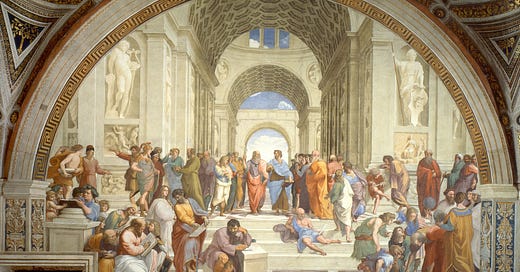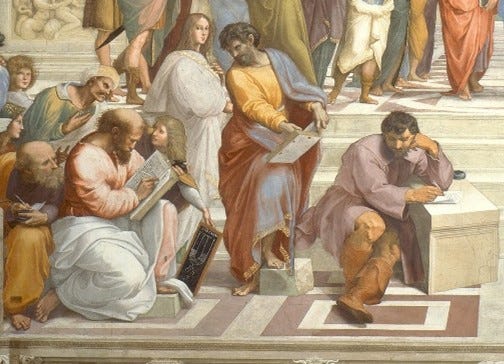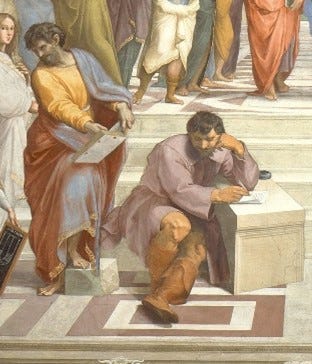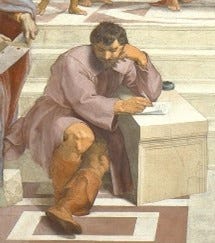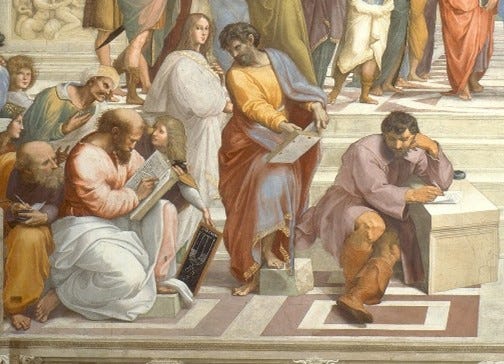THE DISCOVERY OF THE SCHOOL of ATHENS
Part 2 – The Pre-Socratic Philosophers
If we look at those figures in the left foreground, we can see different people who are writing or who are watching others writing, except for one person who is standing, with one foot on a block of stone, pointing to an open book he is holding, and not looking at this book, but looking at the others, as if he is trying to explain something to them, like a teacher, as if he is the first one in this line of people.
This then, I think, could be Thales, who lived from approximately 625 to 545 BC, and since he lived in Ionia, Diogenes places him at the head of the ‘Ionian School’ of Greek philosophers.
The following is from ‘Lives and Opinions of the Eminent Philosopher’ by Diogenes Laertius:
I. Thales, then, as Herodotus and Duris and Democritus say, was the son of Euxanius and Cleobule; of the family of the Thelidae, who are Phoenicians by descent; among the most noble of all the descendants of Cadmus and Agenor, as Plato testifies. And he was the first man to whom the name of Wise was given …
II. After having been immersed in state affairs, he applied himself to speculations in natural philosophy; though as some people state, he left no writings behind him ... According to others he wrote two books, and no more, about the solstice and the equinox; thinking that everything else was easily comprehended. According to other statements, he is said to have been the first who studied astronomy, and who foretold the eclipses and motions of the sun, as Eudemus relates in his history of the discoveries made in astronomy; on which account Xenophanes and Herodotus praise him greatly; and Heraclitus and Democritus confirm this statement.
III. Some again (one of whom is Chaerilus the poet) say that he was the first person who affirmed that the souls of men are immortal; and he was the first person, too, who discovered the path of the sun from one end of the ecliptic to the other; and who, as one account tells us, defined the magnitude of the sun as being seven hundred and twenty times as great as that of the moon. He was also the first person who called the last day of the month the thirtieth. And likewise, the first to converse about natural philosophy, as some say ...
VI. He asserted water to be the principle of all things, and that the world had life, and was full of daemons; they say, too, that he was the original definer of the seasons of the year, and that it was he who divided the year into three hundred and sixty-five days. And he never had any teacher except during the time that he went to Egypt and associated with the priests. Hieronymus also says that he measured the Pyramids: watching their shadow, and calculating when they were of the same size as that was …
IX. And the following are quoted as sayings of his: –
‘God is the most ancient of all things, for he had no birth: the world is the most beautiful of things, for it is the work of God: place is the greatest of things, for it contains all things: time is the swiftest of things, for it runs through everything: necessity is the strongest of things, for it rules everything: intellect is the wisest of things, for it finds out everything.’
So, it seems that Thales studied geometry and astronomy in Egypt, and he said that our souls are immortal, and that the universe is alive and is full with daemons.
[I like to think of daemons as messengers – between the spirit world and the mortal world.]
And because he was first called wise and because he first brought natural philosophy from Egypt to the Greeks, I think that he should be the first of our Greek philosophers in this painting.
Next, if we now look in the direction that Thales is looking, at that person to the left of Thales, we see someone sitting on a block, and with one foot also on a small stone block (like Thales), with others behind him observing his work, while he is writing in a book, with a person holding in front of him a slate, and on this slate is written ‘1 + 2 + 3 + 4 = 10’ (i.e. a tetraktys).
This then, I think, could be Pythagoras, who lived from approximately 570 to 495 BC, and since he left Ionia to live in Italy, Diogenes places him at the head of the ‘Italian School’ of Greek philosophers.
The following is from ‘Lives and Opinions of the Eminent Philosophers’ by Diogenes Laertius:
“III. And as he was a young man, and devoted to learning, he quitted his country, and got initiated into all the Grecian and barbarian sacred mysteries. Accordingly, he went to Egypt, on which occasion Polycrates gave him an introduction to Amasis; and he learnt the Egyptian language, as Antipho tells us, in his treatise on those men who have been conspicuous for virtue, and he associated with the Chaldaeans and with the Magi.
Afterwards he went to Crete, and in company with Epimenides, he descended into the Idaean cave, (and in Egypt too, he entered into the holiest parts of their temples,) and learned all the most secret mysteries that relate to their gods. Then he returned back to Samos, and finding his country reduced under the absolute dominion of Polycrates, he sent sail, and fled to Crotona in Italy. And there having given laws to the Italians, he gained a very high reputation, together with his scholars, who were about three hundred in number, and governed the republic in a most excellent manner; so that the constitution was very nearly an aristocracy.
V. Now, some people say that Pythagoras did not leave behind him a single book; but they talk foolishly; for Heraclitus, the natural philosopher, speaks plainly enough of him, saying, ‘Pythagoras, the son of Mnesarchus, was the most learned of all men in history; and having selected from these writings, he thus formed his own wisdom and extensive learning, and mischievous art’ ...
And there are three volumes extant written by Pythagoras. One on Education; one on Politics; and one on Natural Philosophy …
XI. It was Pythagoras also who carried geometry to perfection … the part of the science to which Pythagoras applied himself above all others was arithmetic. He also discovered the numerical relation of sounds on a single string; he also studied medicine …
XIII. He was also the first person who introduced measures and weights among the Greeks …
XV. But until the time of Philolaus, there were no doctrines of Pythagoras ever divulged; and he was the first person who published the three celebrated books which Plato wrote to have purchased for him for a hundred minae.
XIX. … Alexander also says, in his Successions of Philosophers, that he found the following dogmas also set down in the Commentaries of Pythagoras: – That the monad was the beginning of everything. From the monad proceeds an indefinite duad, which is subordinate to the monad as to its cause. That from the monad and the indefinite duad proceeds numbers. And from numbers signs. And from these last, lines of which plane figures consist. And from plane figures are derived solid bodies. And from solid bodies, sensible bodies, of which last there are four elements: fire, water, earth and air. And that the world, which is endued with life, and intellect, and which is of a spherical figure, having the earth, which is also spherical. And inhabited all over in its centre, results from a combination of these elements, and derives its motion from them …
He also says that the soul of man is divided into three parts; into intuition, and reason, and mind, and that the first and last divisions are found also in other animals, but that the middle one, reason, is only found in man.”
And also the following is from Aetius, in the ‘Doxographi Graeci’ (by Hermann Diels):
“And again from another starting-point, Pythagoras, son of Muesarchos, a Samarian, who was the first to call this matter by the name of philosophy, assumed as first principles the numbers and the symmetries existing in them, which he calls harmonies, and the elements compounded of both, that are called geometrical.
And again he includes the monad and the undefined dyad among the first principles; and for him one of the first principles tends towards the creative and form-giving cause, which is intelligence, that is god, and the other tends towards the passive and material cause, which is the visible universe.
And he says that the starting point of number is the decad; for all Greeks and all barbarians count as far as ten, and when they get as far as this they return to the monad.
And again, he says, the power of the ten is in the four and the tetrad. And the reason is this: if any one returning from the monad adds the numbers in a series as far as the four, he will fill out the number ten (i.e. 1 + 2 + 3 + 4 = 10); but if he goes beyond the number of the tetrad, he will exceed the ten. Just as if one should add one and two and should add to these three and four, he will find out the number ten; so that according to the monad number is in the ten, but potentially in the four. Wherefore the Pythagoreans were wont to speak as though the greatest oath were the tetrad: “By him that transmitted to our soul the tetraktys, which has the spring and root of ever-flowing nature.” And our soul, he says, is composed of the tetrad; for it is intelligence, understanding, opinion, sense, from which things come every art and science, and we ourselves become reasoning beings.
The monad, however, is intelligence, for intelligence sees according to the monad. As for example, men are made up of many parts, and part by part they are devoid of sense and comprehension and experience, yet we perceive that man as one alone, whom no being resembles, possesses these qualities; and we perceive that a horse is one, but part by part it is without experience. For these are all forms and classes according to monads.
Wherefore, assigning this limit with reference to each one of these, they speak of a reasoning being and a neighing being. On this account the monad is intelligence by which we perceive these things. And the undefined dyad is science; fittingly, for all proof and all persuasion is part of science, and farther every syllogism brings together what is questioned out of some things that are agreed upon, and easily proves something else; and science is the comprehension of these things, wherefore it would be the dyad. And opinion as the result of comprehending them is the triad; fittingly, for opinion has to do with many things; and the triad is quantity, as “The thrice-blessed Danaoi”. On this account then he concluded the triad.”
So, it seems that Pythagoras too was educated in Egypt, and he said that the soul of man has intuition and mind, that is also found in other animals, but man’s soul possesses reason, that other animals do not. And because he taught of the harmonies of geometry, especially of the tetraktys, I think that he should be the second of our Greek philosophers.
Next, if we look to the right of Thales, we see someone who is sitting on a step besides Thales, with his feet crossed as if he’s not going anywhere, and he was writing in a book, placed upon a large block that seems to be the remnant of some pedestal or something and that seems to be out of place. But it also looks like he stopped writing and is thinking about some idea, before he continues writing. And this, I think, could be Heraclitus, who lived from approximately 540 to 480 BC.
While Pythagoras was born in Ionia but left for Sicily to establish his school, Heraclitus was born and lived in Ionia, and stayed there even under the wreckage of the Persian conquest and occupation of Ionia, to establish his school.
[Note: The fragments of Heraclitus can be found in ‘Ancilla To The Pre-Socratic Philosophers’, translated by Kathleen Freeman (Harvard University Press) from the ‘Vorsokratiker Fragmente’ by Hermann Diels.]
The following is from ‘Lives and Opinions of the Eminent Philosophers’ by Diogenes Laertius:
I. Heraclitus was the son of Blyson, or as some say, of Heraceon, and a citizen of Ephesus.
II. He was above all men of a lofty and arrogant spirit, as is plain from his writings, in which he says, “Abundant learning does not form the mind; for if it did, it would have instructed Hesiod, and Pythagoras, and likewise Xenophanes, and Hecataeus. For the only piece of real wisdom is to know that idea, which by itself will govern everything on every occasion”.
V. There is a book of his extant, which is about nature generally, and it is divided into three discourses; one on the Universe; one on Politics; and one on Theology. And he deposited this book in the temple of Diana, as some authors report, having written it intentionally in an obscure style, in order that only those who were able men might comprehend it, and that it might not be exposed to ridicule at the hands of the common people ...
The following is from ‘Lives and Opinions of the Eminent Philosophers’ by Diogenes Laertius, under the chapter on ‘Socrates’:
VII. And they say that Euripides gave Socrates a small work of Heraclitus to read, and asked him afterwards what he thought of it, and he replied, "What I have understood is good; and so, I think, what I have not understood is; only the book requires a Delian diver to get at the meaning of it."
So, it seems that Heraclitus spoke about that ‘idea’ that governs everything, and perhaps this is what he is deep in thought about and perhaps that is also what interested Socrates. So, I think, that he should be the third of our Greek philosophers.
Next, we will continue to look at more of these figures around Thales, Pythagoras and Heraclitus.
[ next week - part 3 - the Eleatic paradox ]
